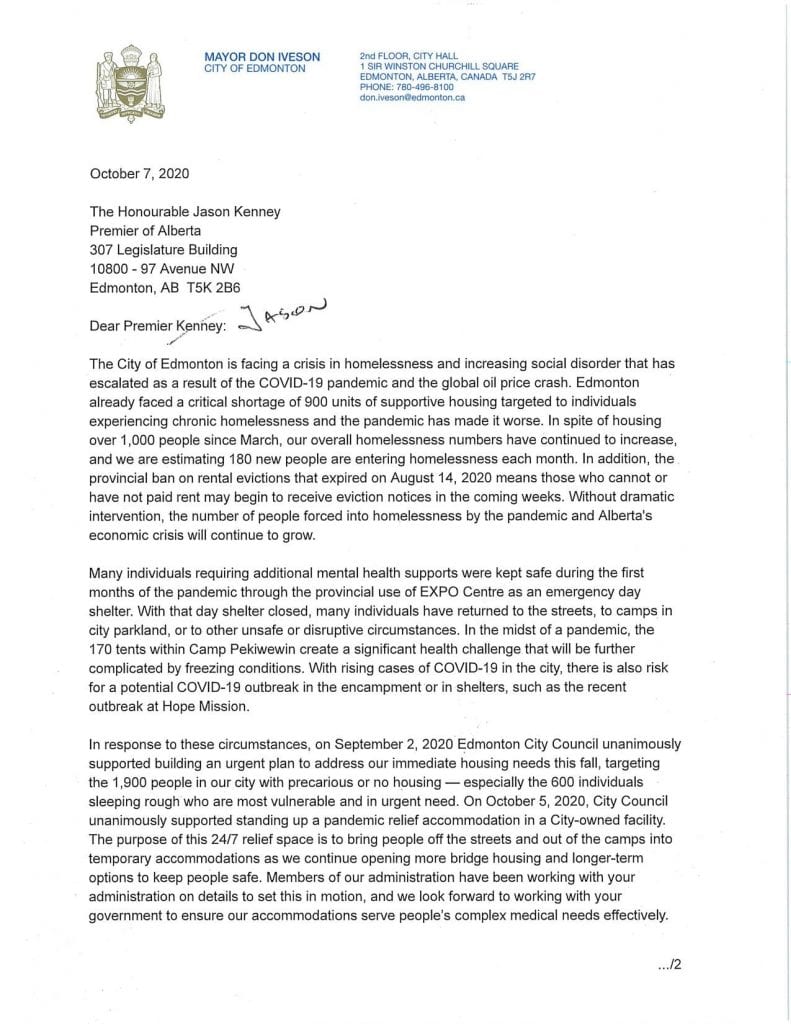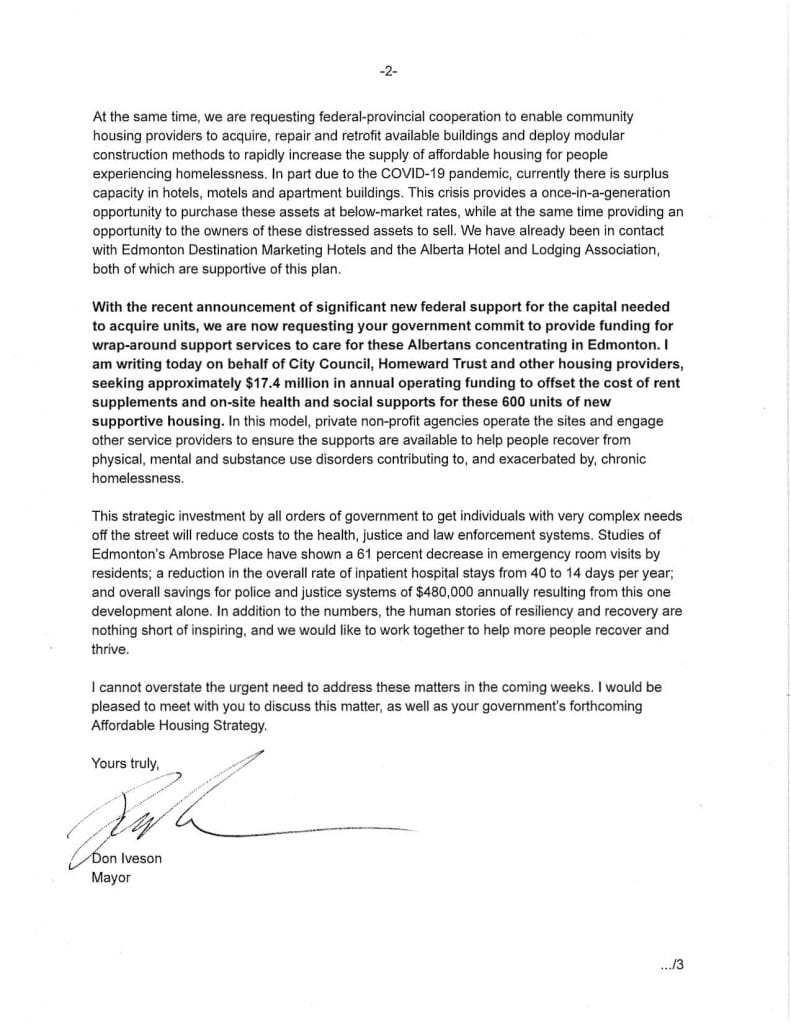Edmonton’s rapid plan to end homelessness
Over the past few months a key focus of mine has been to find a solution to the crisis of homelessness and the associated social disorder that has escalated in our City as a result of the COVID-19 pandemic and troubling economic times we find ourselves in.
From the beginning of the pandemic more and more Edmontonians have become homeless, despite our housing partners and social agencies housing over 1000 people since March of this year. Currently, approximately 2,000 people are experiencing homelessness in Edmonton, with more than 600 sleeping rough outside or unsheltered on any given night—including those at the major encampments.
When the pandemic hit, Edmontonians experiencing homelessness were top of mind for me and many of my City Council colleagues, so we worked with the province to provide a space with 24/7 programming and other supports that would allow them to self-isolate. Self-isolating is a privilege and a luxury when you own a home, but nearly impossible when you’re homeless.
The EXPO Centre’s 24/7 program was made possible by support from the federal and provincial governments. However, this pandemic is lasting much longer than many of us anticipated and in July 2020 the temporary shelter closed. With the end of the program we, sadly, saw individuals return to the streets and to river valley camps.
In August, we worried about the fact that we’d not yet achieved our “10 year plan to end homelessness” (we’re currently in year 11 for those counting). Over my seven years as mayor, we have repeatedly made the case to other levels of government to invest in housing first programs, with mixed results. As such, we’ve begun an ambitious “10 week plan to end homelessness” in Edmonton. This plan involves three parts:
24/7 accommodation site
The first step is to set up pandemic accommodation for Edmontonians experiencing homelessness, to ensure they have somewhere to self-isolate. The City has chosen the Edmonton Convention Centre for this site, which will open by the end of this month (October 2020). It will provide temporary, 24-7 accommodation with day programming and meal service until March 2021. This 24/7 element is key, because it gives residents a place to self-isolate—normally shelters ask that folks leave in the morning. This site also gives us the space to allow for proper distancing for both daytime and overnight operations.
This facility will provide space, services and support to immediately address gaps caused by COVID-19.
To run this accommodation site the City is using $8 million of the safe restart agreement money the federal and provincial governments gave the city. We believes it is the right thing to do for vulnerable Edmontonians and also for our local businesses and communities that are increasingly affected by social disorder. These funds are “one time” COVID-19 relief dollars, meaning Edmonton taxpayers aren’t directly paying for this accommodation space through property taxes.
Bridge housing and permanent supportive housing
Bringing people out of the cold into this 24/7 accommodation site is our immediate goal. We want to keep people safe while we continue to expand bridge housing and longer term supportive and affordable housing options so we can end homelessness permanently.
This is where the second and third parts of the plan come in. They includes advocating to the federal and provincial governments for investments in bridge housing and permanent supportive housing. While at the 24/7 accommodation space, Edmontonians experiencing homelessness will be able to work with housing support workers who can help them transition into bridge housing first and then into supportive housing if they need it.
Bridge housing is housing where people experiencing homelessness can stay for short periods while they work with service providers to secure permanent housing. The Coliseum Inn is an example of bridge housing the City runs through Homeward Trust, in partnership with Boyle Street Community Services. We’re working to get more of this type of housing ready and are using the federal government’s recently announced $1 billion investment in the Rapid Housing Initiative and $236.7 million for the Reaching Home program to get more bridge housing units online.
Securing permanent housing is the final step in our plan and so I’m continuing to advocate, with Big City Mayors across the country, for a larger investment to solve this problem once and for all. In the throne speech the federal government made a historic commitment to ‘completely eliminate chronic homelessness’. I was thrilled to hear them embrace this ambitious goal that will save lives, create jobs, reduce cost and protect vulnerable Canadians.
However, I cannot overstate the urgency of moving forward on further investment in affordable and supportive housing—and how fundamental a strong federal-municipal partnership will be to meet our shared goal of ending chronic homelessness. The Federation of Canadian Municipalities has outlined that we’ll need $3.5 billion to do this, and while the $1 billion announcement is welcomed news—more work is needed.
We want and need to work together with the Province to achieve our goals
Ending homelessness will require a collaborative effort. The City cannot do it alone—housing and homelessness are jurisdictions of the federal and provincial governments, which is why we’re working so hard to advocate for their involvement. For Edmonton’s plan to be a success we need the province to commit to ensuring on-site health and social support services in our bridge and permanent supportive housing units and we need them to offset the cost of rent supplements.
Earlier this week I wrote a letter to Premier Kenney outlining the City’s need, which includes funding for wrap-around support services to care for Albertans experiencing homelessness in Edmonton. Specifically, City Council, Homeward Trust and other housing providers are asking for approximately $17.4 million in annual operating funding to offset the cost of rent supplements and on-site health and social supports for these 600 new units of supportive housing we want to help build.
I’m hopeful the provincial government will meet our request because this strategic investment in ending homelessness will reduce costs in the provincial government’s health, justice and law enforcement systems. Studies of Edmonton’s Ambrose Place have shown a 61 per cent decrease in emergency room visits by residents; a reduction in the overall rate of inpatient hospital stays from 40 to 14 days per year; and overall savings for police and justice systems of $480,000 annually resulting from this one development alone.
Beyond the numbers though, the human stories of resiliency and recovery are nothing short of inspiring. We’re eager to work with all levels of government to help more people recover and thrive, as well as reduce public disorder that impacts both residents and businesses in our city.
We need to act now, because the need is urgent. Edmontonians cannot wait any longer for another plan to end homelessness.


It is time for action, countrywide!
I am homeless, and due to some temp work I was exposed to an infected individual, and now with some possible symptoms, I had to be tested for covid-19. I was shocked to find out that, due to being homeless, I don’t have to quarantine myself as there is nowhere available for such action anyways. I was advised to follow hygiene, ppe and social distancing protocols. This is a bit disturbing as this means that I and others have probably been in close contact with other confirmed covid-19 cases within the homeless communities. These people, just like myself, have ties to mainstream segments of society and as such this gap in policy can affect everyone, not just the homeless. My belief is that this poses a real public health dilemma.
Beyond my rant above, I want to commend you for your advocacy for the homeless, and your forward looking, fact based approach to the whole issue. This is a very trying time to have such an approach when faced with ideologies that are prejudiced and based upon here say rather than scientific evidence. So thanks again!
Correct me if I’m wrong, but currently you’re looking at cutting budgets. Fire rescue services for example, but spending money on this initiative to end homelessness within our city? I’m all for helping those less fortunate, but at what cost? Essential, frontline workers should be your priority right now. Maybe go for a walk through these encampments and personally see what goes on and what will continue to go on no matter where you place this population.